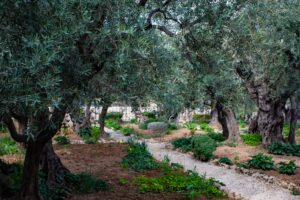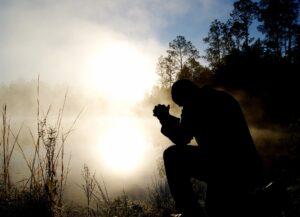
“But I have prayed for you that your faith should not fail.” Luke 22:32
In Jesus’ final hours on earth, He instituted the Lord’s Supper, identified His betrayer, and, most importantly, attempted to prepare the disciples for the coming events. His attempt failed.
The disciples did not realize the significance of any of these moments. Likewise, they did not note anything unusual about Jesus taking a walk after the Passover meal to the Mount of Olives.
Luke 22:39 says, “He went to the Mount of Olives, as He was accustomed.” Walking the one-mile trek across the Kidron Valley to the Mount of Olives after dinner was a common and usual activity for Jesus whenever He was in Jerusalem. Therefore, on this night, the night of His betrayal and arrest, the disciples did not notice anything unusual.
However, things began to change once they arrived at the Mount of Olives. Soon, Jesus would experience a series of heartbreaking moments even while gearing Himself up for the supreme duty of taking on the sins of the world.
Jesus in the Garden
The Mount of Olives is a very beautiful and peaceful place. The Garden of Gethsemane, which occupies one corner of the mount, is especially lovely.
The garden overlooks the Kidron Valley and sits directly across from the Temple Mount, where the holy house of God once stood until its destruction in 70 A.D. Understandably, Jesus liked to escape there to be quiet and pray. So, it is equally if not more, understandable that He should want to be there on this particular night.
The disciples traveled with Jesus to the garden. Once they arrived, He asked His closest friends–Peter, James, and John–to go into the garden with Him while the others stayed at the entrance gate (Matthew 26:36-27; Mark 14:32-33). After a short walk, Jesus instructed the three men to pray that they do not fall into temptation, meaning the temptation of sleep.
Jesus is testing the disciples. He is attempting to confirm their commitment and trust in Him. He knew they were tired, but He wanted them to learn that only divine help would be sufficient for the events ahead.
Jesus then “withdrew,” translated in Luke 22 as apospao, meaning “tear away.” This translation tells us Jesus had to tear Himself away from His beloved friends, and He could only manage to go “a stone’s throw” away before He had to pray. Matthew 26:39 and Mark 14:35 both say He fell to pray, either on His face or knees. Either way, it is evident Jesus was already experiencing great sorrow.

The First Heartbreak
Because Jesus was only “a stone’s throw” away, it is likely the disciples heard His prayer. They likely heard His great emotion as He begged the Father to “take this cup away” and saw Him sweat so profusely it appeared “like great drops of blood (Luke 22:44).”
We know the disciples became concerned for Jesus because, by the time Jesus returned to them, He found them “sleeping from sorrow (v45).” Luke’s description indicates the disciples knew something terrible was going on, but fatigue overtook them. Matthew 26:41 shows us Jesus became very frustrated.
“What! Could you not watch with Me one hour? Watch and pray, lest you enter into temptation.”
But even in His frustration, Jesus understands our physical limits, which is why He quickly shows compassion.
“The spirit is willing, but the flesh is weak.”
The disciples were anxious to the point of exhaustion, leaving the Lord to face His fears alone. This was Jesus’ first heartbreak that night. The disciples cared, but they could not adequately assist Him in His hour of need.
Perhaps worse, Jesus knew He would endure the remainder of His last night alone as well.

Judas’ Betrayal
While Jesus scolded the disciples for falling asleep, a “multitude” of temple guards, representatives of the Sanhedrin, a Roman soldier, and Judas Iscariot arrived with lanterns, torches, and weapons. Gathering around Jesus, Judas famously kissed Him to signal to the guards who to arrest. Jesus rebuked Judas by saying, “Judas, are you betraying the Son of Man with a kiss (Luke 22:48)?” Matthew 26:49-50 records the encounter this way:
“Immediately, he went up to Jesus and said, ‘Greetings, Rabbi!’ and kissed him. But Jesus said to him, ‘Friend, why have you come?'”
Judas’ familiarity with Jesus and false affection was Jesus’ second heartbreak. Note the Lord’s curt response when He calls Judas “friend.” The Greek word used for “friend” here does not imply someone who is a close companion. Instead, Matthew uses the Greek word for “comrade,” someone who is only an associate. Jesus is describing Judas’ heart to him and acknowledging their relationship had taken a sad turn.
Jesus’ question convicts Judas, causing him to realize the full depth of his betrayal. Perhaps he remembered how Jesus specifically chose him to be a disciple and a friend, that Jesus had faith in him. But his disloyalty was so great and egregious he later hung himself (Matthew 27:5)
It surely must have been a very painful moment for both Judas and Jesus. Nevertheless, it was all part of God’s redemption plan.
Peter Denies Jesus
Judas was not the only one who betrayed Jesus that night.
After the temple guards arrested Jesus in Gethsemane, they took Him first to Annas, the former high priest and Caiaphus’ father-in-law (John 18:13), for a so-called religious trial. Jesus was then bound and led to the current High Priest Caiaphus’ house, where “the scribes and the elders were assembled (Matthew 26:57).”
Religious law dictated that trials occur during daylight hours, but Jesus’ trial occurred in the middle of the night. This fact, coupled with an arranged assembly of scribes and elders, makes it clear the Pharisees’ conspiracy was going perfectly.
Just outside Caiaphus’ house, Peter, who wanted to see what would happen to the Lord, sat down next to the high priest’s servants. As he watched the unfolding events, a servant girl walked up to him and proclaimed she saw him with Jesus. Peter immediately denied the accusation.
Not long after, a second girl identifies him as Jesus’ disciple, to which Peter more emphatically says, “I do not know the Man (Matthew 26:72)!” Luke 22:60 records Peter saying, “Man, I am not!”
About an hour later, someone else approaches Peter with the same allegation. This unidentified person asserts Peter is Galilean, so he must be a disciple. Even more upset now, Peter shouts back, “Man, I do not know what you are saying!” Both Matthew 26:74 and Mark 14:71 record Peter “began to curse and swear, saying, ‘I do not know this Man of whom you speak!'”
As Peter shouts, a rooster crows, causing Jesus to turn and look “intently” at Peter (Luke 22:61), perhaps compassionately, with conviction, or both. One can only imagine Peter’s searing guilt as he remembered Jesus’ words spoken just hours earlier during supper.
Just as Jesus predicted, Peter denied the Lord three times before a rooster crowed twice (Matthew 26:34; Mark 14:30). Mark records Peter immediately broke into tears. Matthew 26:75 and Luke 22:62 both say he “wept bitterly.”
Peter’s denial is Jesus’ third heartbreak. Though He had predicted Peter’s actions, Jesus surely was sad they had come to pass. Peter, too, was obviously heartbroken. But the event proves that no matter how horribly we fail, God is willing and able to restore us.
From Heartbreak to Restoration
Following His resurrection, Jesus appeared to the disciples three times. The third time, the disciples, including Peter, were unsuccessfully fishing on the Sea of Galilee when Jesus appeared on the beach and told them to cast their nets “on the right side of the boat (John 21:6).” Just as the day when Jesus first met Peter and called him a “fisher of men (Matthew 4:18–22; Mark 1:16–20; Luke 5:2–11; John 1:40–42),” He once again filled the nets to overflowing. Then He and the disciples enjoyed breakfast together (John 21:1-14).
Following their meal, Jesus took Peter aside and asked him, “Simon, son of Jonah, do you love Me more than these?” Jesus asked Peter the same question three times, and each time, Peter affirmed His love. Jesus was not simply testing Peter’s love for Him; He was restoring Peter.
Three times Peter denied Jesus that night at Caiaphus’ house. In turn, Jesus required him to affirm his love and devotion three times. Peter’s commitment was essential if he was going to lead the apostles and be an effective shepherd of the newly established church.
In the same manner, Jesus requires our commitment and devotion. Our love for Him must supersede everything else in our lives. When we put Him first in our lives, when He is the center of everything we say and do, we can be sure that He will faithfully restore us should we fall down in our walk with Him.

Jesus Prays for Us
Thankfully, before we ever have need for restoration, we can be confident that Jesus has already prayed for us, just as He did for Peter during the Last Supper.
“And the Lord said, ‘Simon, Simon! Indeed, Satan has asked for you that he may sift you as wheat. But I have prayed for you that your faith should not fail, and when you have returned to Me, strengthen your brethren.” Luke 22:31-32
In the Greek text, Satan did not ask for only Peter; he asked for all the disciples. But Jesus intervened, telling Peter that He prayed for all of them and Peter specifically. Jesus, likewise, prays for us. He is our true high priest, and He lives to make intercession for us (Hebrews 7:25). He is always praying for us before the Father.
Jesus knows we are going to fail. He knows we are fallible, yet in His great love and grace, He is already praying for us so that when Satan attempts to sift us, we may be refined and strengthened through His divine restoration. Through our experiences, we create a testimony that encourages others.
The events the night of Jesus’ arrest broke His heart, but perhaps the worst heartbreak was in knowing that so many people reject Him, both then and now. Even so, He willingly died on our behalf and paid the price of death we owe. It was His joy to endure the cross (Hebrews 12:2) so that we might experience freedom and eternal life. And it is His joy to walk alongside us every day.
God’s love is everlasting even when we break His heart. His compassion is unmatched. Though we are not always faithful to Him, He is constantly faithful and diligently praying for us. He is ready to forgive and restore us again and again if we just seek Him, trust Him, and endure.

Amen Hallelujah thank you very much for sharing with me the bread of life which is the word of God, Amen Hallelujah
It is very motivated and it heals my body and my spirit, Hallelujah Hosanna in the Haeven In Jesus Christ Name Amen